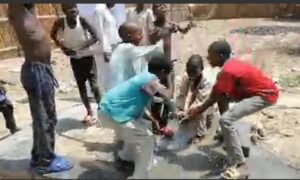
By Bintu Ahmed
Kanoke rugar Hamza, is a Fulani settlement and one of the border communities along the Nigeria and Nigerian border in Kaugama local government area of Jigawa state.
It covers a distance of about three kilometers, roughly an hour’s walk to reach the main town of Kaugama local government.
The settlers of the area, cover the distance on daily basis in search of portable water for their daily use and for their animals to drink.
Muhammadu Jauro, aged 59, a resident of the community, said in an interview with digitaldispatch correspondent, that the situation remained the same for many years.
Jauro, claimed that the children and women of the community, have long been exposed to many dangers in the process of searching for water, especially that they had to cross the major and busy roads with high speeding vehicles.
Mrs Furaira Usumanu, a middle aged mother of four, who also spoke to our correspondent in tears, claimed that it was tears of joy and pity for her children, because they will no longer have to walk a distance to get water.
She commended a Foundation that provided water project to their community, which she said came as a relief and prayed to God to provide the providers with abundant reward for easing their task.
The above situation is a clear testimony by the World Water Assessment, that “The World is confronted with a water crisis that threatens both populations and ecosystems.”
A Civil Engineer, Engr Umar Abdullahi, told our Correspondent that governments alone across the globe, cannot solve water issues due to the multiple challenges the world is facing in water supply and provision causes by global environmental crisis.
“There must be some other ways to be deployed to assist the governments in providing potable water in many communities especially the remote and in accessible communities.
“Water is very crucial for all aspects of life, especially in communities that struggle with poverty and diseases. It’s shortage is both environmental and social crisis.” Abdullahi explained.
Many thanks to a Foundation that moved to solve water problems in vulnerable and remote communities of Kano and Jigawa states over the years, thus provided access to water, to more than 500,000 people.
Widi Jalo Foundation, founded by Abubakar Widi-Jalo, a civil servant working with the National Assembly, has provided water projects to 170 remote communities in Jigawa state and 60 communities in Kano state, Nigeria respectively.
In an interview, Mr Widi-Jalo said, the water project idea, was conceived when a coalition stumbled on a community facing extreme water shortage while distrubuting food for palliatives during Covid-19 pandemic.
“While we were busy giving people food, which we also generated through crowdfunding at the time of the pandemic, we uncovered remote communities that were craving for water more than the food.
“We started small with our own little resources aith some friends and family members and later an idea came to utilize the multiple social media followership I had to raise more fund and assist more communities.” He explained.
As time went on, the Founder explained, they identified the need to provide clean potable drinking water to deprived communities and villages in rural areas and also some urban areas, experiencing acute water shortage.
The Foundation with support from some partner organisations, have succeeded in carrying out more than 450 projects and affected the lives of more than 500,000 people.
On sustaining the water projects in form mechanised boreholes, the foundation said it has trained some people within the benefitting communities on minor repairs.
“We have monitoring officers and project managers in Jigawa and Kano states, who liaise with the community and monitor the water projects.
“They inform the Foundation on the need for major repairs and we take the responsibility of the major repairs whenever the need arises.” He said.
Mr Usman Audi of Tosarawan Kanawa community in Malam Madori local government of Jigawa state, one of the beneficiary communities for the Foundation’s water projects, confirmed was trained on minor repairs.
“When they were working on the borehole, I was with them and helping out. On seeing my potentials and interest, they trained me on minor repairs.
“The community has held a meeting an agreed to gather money when a major issue occur, so that we will hire a trained Engineer to work on the borehole when it developed major fault.” Audi explained.
With every project, challenges are inevitable and the Foundation says it needs more fund, in order to reach more people, more communities, 8n view of increasing demand for water across the sahel.
Established and duly registered in 2020, the Foundation has reached and impacted approximately 500,000 in both Kano and Jigawa states respectively.
The various water projects were conducted with support from other non governmental organisations as well individuals.
Some of the NGOs that supported the Widi-Jalo Foundation are Hotri Nigeria, Gatan Marayu foundation, Assasatu albir foundation, Round table Umma, Bakari and Audi foundation, Al-Maraa foundation, Foundation for refugee empowerment, Muslima foundation, Sarkin Fulanin Lagos foundation and Light up foundation.
Some of the communities that benefitted from the various water projects in Jigawa communites include, Kabaan Kaugama, Ibn Saad inmHadeija, Malama in kafin Hausa, Agubo in Mallam madori, Gaduwa in Guri, Ajaura in Taura,Guranyo in Auyo, Sheik modibbo school, in Yalleman, to meIn Kano, some benefitting communities include, Behun fulani in Dawakin kudu, Dan busai in Bichi, Rimin kebbe in Nassarawa, Tamawa in Rimin Gado, Darmanawa in Tarauni, Kurmawa Central Prison in Municipal, Dorayi kofar yamma in Tsanyawa, to mention a few.
